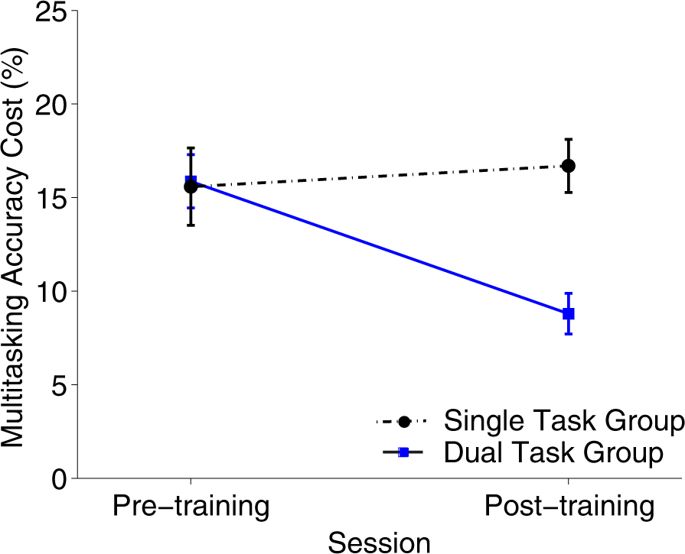npj Science of Learning ( IF 4.2 ) Pub Date : 2017-12-04 , DOI: 10.1038/s41539-017-0015-4 Angela D. Bender , Hannah L. Filmer , Claire K. Naughtin , Paul E. Dux

|
The ability to perform multiple tasks concurrently is an ever-increasing requirement in our information-rich world. Despite this, multitasking typically compromises performance due to the processing limitations associated with cognitive control and decision-making. While intensive dual-task training is known to improve multitasking performance, only limited evidence suggests that training-related performance benefits can transfer to untrained tasks that share overlapping processes. In the real world, however, coordinating and selecting several responses within close temporal proximity will often occur in high-interference environments. Over the last decade, there have been notable reports that training on video action games that require dynamic multitasking in a demanding environment can lead to transfer effects on aspects of cognition such as attention and working memory. Here, we asked whether continuous and dynamic multitasking training extends benefits to tasks that are theoretically related to the trained tasks. To examine this issue, we asked a group of participants to train on a combined continuous visuomotor tracking task and a perceptual discrimination task for six sessions, while an active control group practiced the component tasks in isolation. A battery of tests measuring response selection, response inhibition, and spatial attention was administered before and immediately after training to investigate transfer. Multitasking training resulted in substantial, task-specific gains in dual-task ability, but there was no evidence that these benefits generalized to other action control tasks. The findings suggest that training on a combined visuomotor tracking and discrimination task results in task-specific benefits but provides no additional value for untrained action selection tasks.
中文翻译:

动态,连续的多任务培训可带来针对特定任务的改进,但不会跨动作选择任务转移
在我们信息丰富的世界中,同时执行多个任务的能力是不断增长的要求。尽管如此,由于与认知控制和决策相关的处理限制,多任务处理通常会损害性能。虽然众所周知,密集的双任务训练可以提高多任务处理性能,但是只有有限的证据表明,与训练相关的性能优势可以转移到共享重叠过程的未经训练的任务上。但是,在现实世界中,在时间紧迫的环境中协调和选择多个响应通常会在高干扰的环境中发生。在过去十年中,有值得注意的报告指出,在要求苛刻的环境中进行需要动态多任务处理的视频动作游戏的培训可能会导致认知方面(如注意力和工作记忆)的转移效果。在这里,我们询问连续和动态的多任务训练是否在理论上与受训任务相关的任务上带来了好处。为了研究这个问题,我们要求一组参与者对连续的视觉运动跟踪任务和感知辨别任务进行组合训练,共进行六个会话,而一个活跃的对照组则单独进行练习。在训练之前和之后立即进行一系列测试反应选择,反应抑制和空间注意力的测试,以研究转移。多任务训练导致大量的,双重任务能力获得了特定于任务的收益,但是没有证据表明这些收益可以推广到其他行动控制任务。研究结果表明,对组合的视觉运动跟踪和辨别任务进行培训会带来特定于任务的收益,但对于未经训练的动作选择任务并没有额外的价值。


























 京公网安备 11010802027423号
京公网安备 11010802027423号